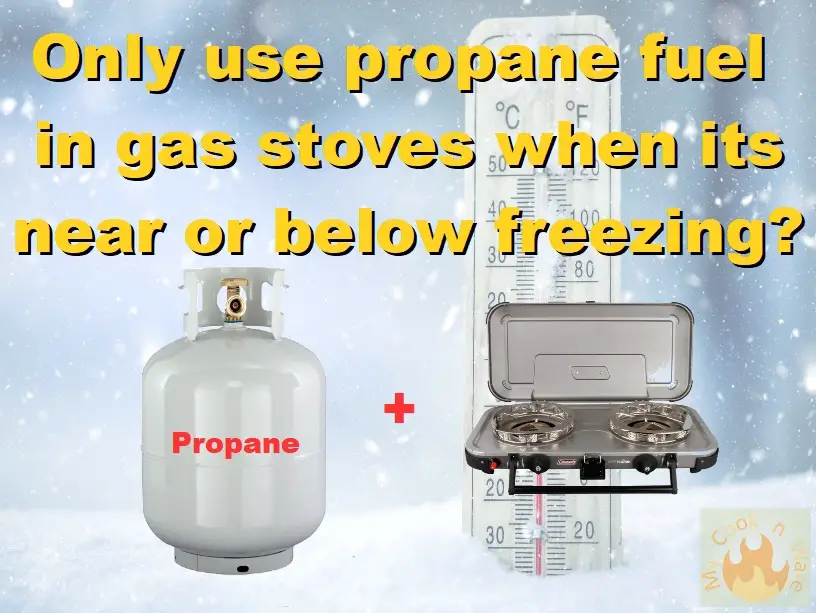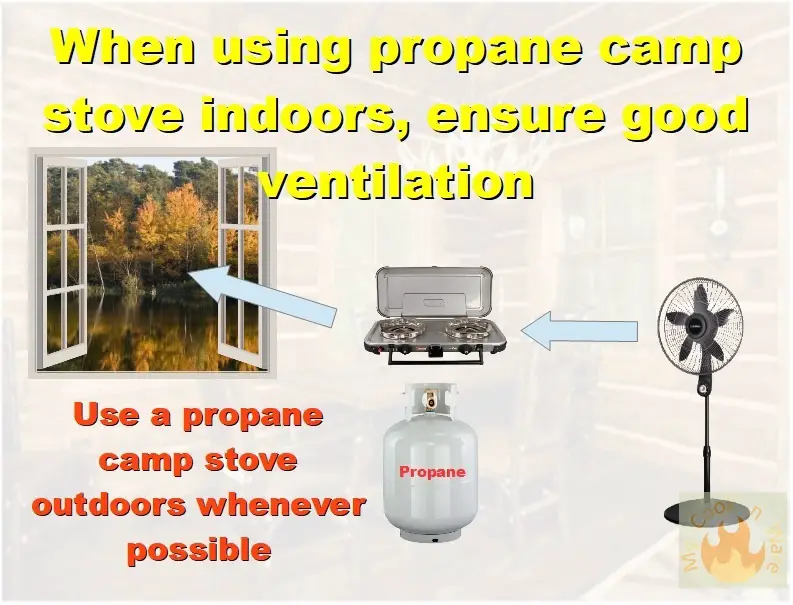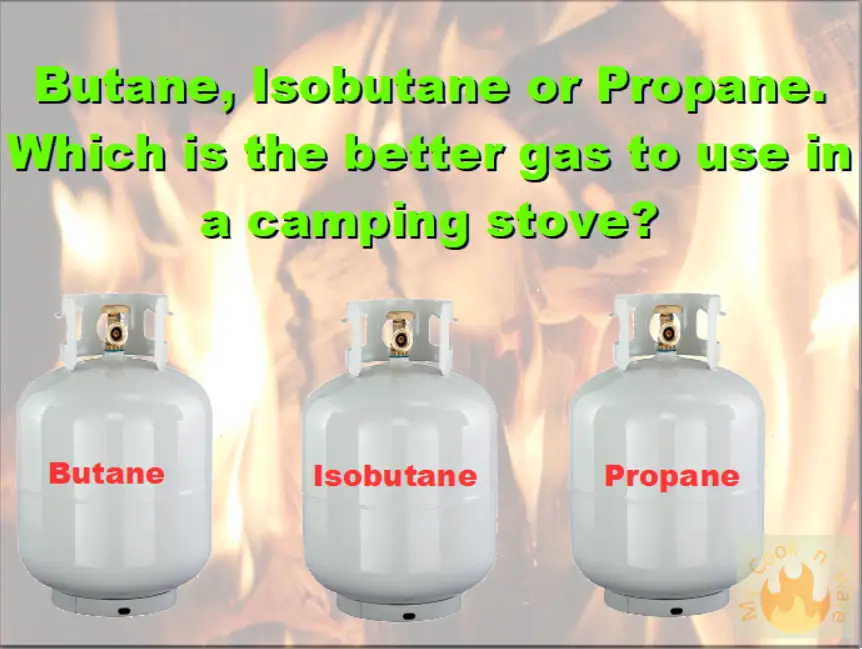Butane, isobutane, or propane are the 3 most common gas fuels used in camp stoves.
Best gas to use for hikers.
Butane is the best gas for hikers. Butane is stored at a much lower pressure than propane, therefore a butane storage cannister can be made much lighter than a propane tank as it doesn’t have to as strong.
However, be mindful that butane will not work at temperatures near and below freezing. Hiking in cold weather with an LPG stove is best to use isobutane as your fuel source.
Best gas to use for camping.
If you can carry an LPG bottle in your car then propane is the best option, as the extra weight is not really as noticeable as if you were hiking.
Propane is both cheaper and more readily available than butane.
- Best gas to use for hikers.
- Best gas to use for camping.
- Tech Talk – Liquid Petroleum Gas.
- Comparing chemical attributes of butane, isobutane, or propane.
- Why do hikers use Butane instead of Propane as a camping stove fuel?
- Why use Propane instead of Butane in a camping stove?
- Why use Isobutane?
- Which LPG burns hotter, butane, isobutane, or propane?
- Is it safe to cook and heat indoors with butane, isobutane, or propane stoves?
- Is it safe to use a propane stove indoors?
- Can I use a butane, isobutane, or propane stove camping stove in a tent?
- How to test for leaks in an LPG canister or camping stove.
- Which is cheaper LPG gas, butane, isobutane, or propane?
- Can you swap butane, isobutane, or propane in the same camp stove?
- Which is the better camping stove gas for cooking, butane, isobutane, or propane?
- Why is LPG sold by weight?
- Why does the gas bottle feel cold when releasing the gas?
Tech Talk – Liquid Petroleum Gas.
Butane, isobutane, and propane are all classified as Liquid Petroleum Gas (LPG), these versions of LPG are flammable hydrocarbon gasses, which when pressurized turn into a liquid. A pressurized cylinder, canister, or bottle, stores the LPG. Using the LPG reduces the pressure in the gas bottle, and the space above the liquid fills with the pressurized gas.
All LPG has an inherent boiling point where the liquid turns into gas, this point changes for each gas and the storage pressure and temperature.
Below is the specific data of butane, isobutane, and propane, that can help make sense of the best gas fuel for your camp stove needs.
| Gas Properties | Isobutane | Butane | Propane |
| Chemical Formula: | C4H10 | C4H10 | C3H8 |
| Energy Content: MJ/kg | 45.59 | 47.39 | 49.58 |
| Boiling Temp: Cº | -11.75 | -0.4 | -42 |
| Pressure @ 21ºC: kPa | 310.9 | 215.1 | 858.7 |
| Flame Temp: Cº | 1975 | 1970 | 1967 |
| Gas Volume: m3/kg | 0.402 | 0.405 | 0.54 |
| L per kg: | 1.669 | 1.724 | 1.96 |
Comparing chemical attributes of butane, isobutane, or propane.
Propane has the highest energy content and will vaporize at the lowest temperature.
The highest pressure gas is Propane. In fact, 4 times that of butane, and isobutane.
Butane and isobutane have for the most part similar qualities. The most significant difference is the temperature at which isobutane vaporizes is much lower.
Why do hikers use Butane instead of Propane as a camping stove fuel?
For hikers and backpackers camping stoves the burden of carrying LPG fuel can add up to a lot of weight. Butane canisters weigh less than propane, making butane makes a lighter weight alternative.
Why use Propane instead of Butane in a camping stove?
The significant advantage of propane over butane is cold-weather performance. In cold conditions that can be found in higher altitudes, or winter climates butane will not vaporize at any temperature less than -0.4Cº.
Propane is a little bit cheaper than butane, and propane is more widely used, so getting refills is usually much easier.

Why use Isobutane?
Isobutane is similar to butane in weight, but its distinct advantage is that it works much better in cold temperatures. This makes isobutane a better choice when hiking in winter and colder climates.
Which LPG burns hotter, butane, isobutane, or propane?
Butane, isobutane, and propane burn at different temperatures. The flame temperature of isobutane is marginally hotter than butane or propane. However, in the practical use of a camping stove, the difference is so small that the slightly lower flame temperature of propane is not noticeable when boiling water, cooking, or heating.
Propane does have a slight advantage in the energy content per weight, meaning that propane is a slightly more efficient fuel by weight. Due to differences in specific gravity (aka volume per weight) propane delivers approximately 90% of the energy of butane and isobutane.
Therefore, if variables are controlled (i.e. not using more flame than needed) butane will last longer than propane?
Is it safe to cook and heat indoors with butane, isobutane, or propane stoves?
Although not recommended, yes you can cook indoors when using Propane, butane, and isobutane camp stoves. However, some serious safety precautions should be undertaken first. There is no such thing as a safe indoor propane stove. So let’s dive a bit deeper into this point before we go any further.
If you are purchasing an LPG camping stove with the intention of using it indoors, you are buying the wrong stove.
You can use an LPG stove indoors but must ensure very good ventilation. If you primarily cook indoors, do not plan on using an LPG stove, there are much better options, such as an alcohol stove.
There are a few problems with using gas camping stoves indoors. The first being byproducts of burning LPG. LPG will burn relatively clean, but there are still some nasty by-products harmful to your health.
Is it safe to use a propane stove indoors?
Always ensure good ventilation if using a propane camp stove indoors.
Butane, isobutane, and propane when burning all give off carbon dioxide, and carbon monoxide, in concentration these gasses are very dangerous, which is easily mitigated by operating the stoves in open and well-ventilated areas.
LPG camp stoves usually burn clean, that is they don’t create a lot of smoke or leave a lot of soot on your pots. If you notice smoke or soot developing this is a sign of too much carbon and clean-burning is not occurring. This could mean something is wrong, and the gas is not burning properly and creating more carbon dioxide and carbon monoxide. If this happens indoors turn off the stove and investigate, if you must continue to use the stove use it outdoors only.

Can I use a butane, isobutane, or propane stove camping stove in a tent?
See above, using a camping stove inside a tent can be very dangerous. All the same rules apply, except there is another hazard that particularly concerns tents. Modern tents are made from flammable materials, such as nylon or polyester. Spilling an LPG-burning stove inside a tent is a major concern. We do not recommend using an LPG inside a tent.
And to close out, we can’t stress this enough, using an LPG stove requires good ventilation. Your primary cooking environment should be outdoors, if you have to use an LPG stove indoor, make sure there are no leaks, and ensure the dwelling is well ventilated to the outside.
How to test for leaks in an LPG canister or camping stove.
Before using a butane, isobutane, or propane stove you should always check for leaks. The easiest way to check for leaks is by using soapy water. You may not always hear a gas leak but they can be deadly. With portable gas stoves, they are always being subjected to knocks, so it is recommended to check before every use.
Soapy water will bubble when gas is passed through it at pressure. Start by spraying soapy water over all connection points, and taps. Turn on the gas and light the stove.
Watch the connection points where soapy water was sprayed, if you see bubbles forming shut off the gas supply immediately and check the connections. If the connections cannot be redone to stop the gas leak, do not use as an explosion may occur.
If you smell rotten eggs, that is unburnt gas. Shut off all gas at the source immediately.
Which is cheaper LPG gas, butane, isobutane, or propane?
Propane is less refined than butane, which is less refined than isobutane. As the refining process adds extra cost, propane is usually the cheapest of these LPG’s. Historical records of gas supply support that propane is usually the cheapest of these 3 gasses.
Can you swap butane, isobutane, or propane in the same camp stove?
If you have ever wondered if you can use propane in a butane camp stove, the answer is yes, but there is a catch. You cannot simply connect a propane gas bottle to a butane stove. An LPG stove is set up for the gas it has been designed to use.
Fortunately, this is easy to change. The setup is simply the nozzle between the gas bottle and the stove, using the correct nozzle for the gas used is all that is required. Where this becomes difficult is if the stove you buy doesn’t have a nozzle kit to change the gas over.
Which is the better camping stove gas for cooking, butane, isobutane, or propane?
There is little difference between butane, isobutane, or propane gas, in pure cooking terms.
If you are hiking then butane and isobutane will be lighter to carry, if you are hiking in an area near or just below freezing conditions then isobutane has a good balance between lightweight and working in cold temperature.
If you are intending to use a gas stove at well below freezing temperatures then propane is the only choice.
Why is LPG sold by weight?
LPG is sold by weight as a means to be able to measure a quantity of LPG. Weight is a constant, whereas LPG volume will change with pressure and temperature, but the weight will remain constant.
Why does the gas bottle feel cold when releasing the gas?
LPG is stored in liquid form under pressure in the gas bottle. When pressure is released from the gas bottle the decreasing pressure causes some of the liquid to evaporate, and then be released as the gas we can hear, and burn. As the LPG evaporates it cools down the liquid through evaporative cooling which can be felt like a cooling of the gas bottle.


